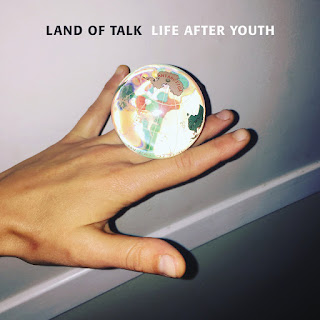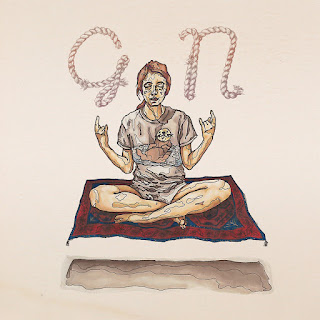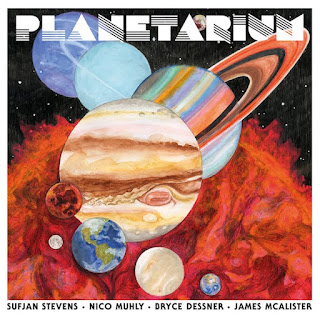This post is ridiculously, inexcusably late, but another writing project has been sucking up all of my creative energies, and I've also been spending more time with older music before my schedule of anticipated new releases starts looking too crazy again. That being said, despite having plenty of high-quality new releases to obsess over in quarter one, quarter two easily blows it out of the water. At least six of these albums are genuine top ten contenders, and the others aren't too shabby either. I probably could have eliminated a handful that I haven't come back to as often for brevity's sake, but we all know that brevity isn't my strong suit. Besides, there's no such thing as too much music. Just take a break halfway through if you need to.
 Honestly, I've gotten to the point as a music fan where not many things stop me dead in my tracks anymore. But Algiers' "The Underside of Power," particularly the rousing gospel-infused chorus, did exactly that when I first heard it. Afterward, I listened to the band's self-titled debut, and all I could do was marvel in slack-jawed amazement at its ingenious blend of post-punk and soul. Taken as a whole, The Underside of Power isn't quite as consistently jaw-dropping: although the songwriting is still impressive, the performances still robust, and Franklin James Fisher's gravelly howl still affecting, the novelty of the band's genre-mixing has worn off. Still, the political urgency of songs like the justifiably outraged "Cleveland" and the stormily atmospheric "Hymn for an Average Man" makes it a necessary - and powerful - album for volatile times.
Honestly, I've gotten to the point as a music fan where not many things stop me dead in my tracks anymore. But Algiers' "The Underside of Power," particularly the rousing gospel-infused chorus, did exactly that when I first heard it. Afterward, I listened to the band's self-titled debut, and all I could do was marvel in slack-jawed amazement at its ingenious blend of post-punk and soul. Taken as a whole, The Underside of Power isn't quite as consistently jaw-dropping: although the songwriting is still impressive, the performances still robust, and Franklin James Fisher's gravelly howl still affecting, the novelty of the band's genre-mixing has worn off. Still, the political urgency of songs like the justifiably outraged "Cleveland" and the stormily atmospheric "Hymn for an Average Man" makes it a necessary - and powerful - album for volatile times. Big Thief seemed to arrive fully-formed out of nowhere last year to deliver Masterpiece, a bold and blustery amalgam of alt-country and indie rock. In the spaces between the twangy rockers, there were introspective slices of storytelling, and it is their smoldering intensity that the band's second album, Capacity, builds on to stunning effect. Adrianne Lenker approaches her songs like short stories, populating them with vivid characters and images from her own life. In "Mythological Beauty," she deftly weaves a childhood near-death experience into the larger tapestry of her mother's struggles as a young parent. "Mary" (the best song of the year so far, for my money's worth) is a twinkling, stream-of-consciousness tribute to a best friend's many exploits that culminates in a cascading litany of impressionistic words.
Big Thief seemed to arrive fully-formed out of nowhere last year to deliver Masterpiece, a bold and blustery amalgam of alt-country and indie rock. In the spaces between the twangy rockers, there were introspective slices of storytelling, and it is their smoldering intensity that the band's second album, Capacity, builds on to stunning effect. Adrianne Lenker approaches her songs like short stories, populating them with vivid characters and images from her own life. In "Mythological Beauty," she deftly weaves a childhood near-death experience into the larger tapestry of her mother's struggles as a young parent. "Mary" (the best song of the year so far, for my money's worth) is a twinkling, stream-of-consciousness tribute to a best friend's many exploits that culminates in a cascading litany of impressionistic words. On its surface, Philadelphia three-piece Cayetana's New Kind of Normal, may seem like a straightforward rock album - perhaps even one that doesn't take itself too seriously. But, while by no means self-important, the album tackles heavier topics than one might expect. Augusta Koch writes with brutal, direct honesty about her experiences with mental health, which, in their singularity, become universal. Every song is packed with one-liners as cathartic as they are pithy, made all the more so by Koch's gritty, passionate vocals. "I could be so much better if I just get my shit together," she sings wearily at the album's halfway point. But it's like swimming against the current when she "can't articulate the words trapped in [her] head" and "can't get out of bed." In documenting her own pain, Koch builds a lifeboat to pull others up with her.
On its surface, Philadelphia three-piece Cayetana's New Kind of Normal, may seem like a straightforward rock album - perhaps even one that doesn't take itself too seriously. But, while by no means self-important, the album tackles heavier topics than one might expect. Augusta Koch writes with brutal, direct honesty about her experiences with mental health, which, in their singularity, become universal. Every song is packed with one-liners as cathartic as they are pithy, made all the more so by Koch's gritty, passionate vocals. "I could be so much better if I just get my shit together," she sings wearily at the album's halfway point. But it's like swimming against the current when she "can't articulate the words trapped in [her] head" and "can't get out of bed." In documenting her own pain, Koch builds a lifeboat to pull others up with her. The itch for all things '90s revival seems to be real lately, and Charly Bliss' debut, Guppy, easily scratches it. With its girly-grungy sound, aggressive instrumentation off-set by Eva Hendricks' helium-pitched voice cooing sickly sweet melodies, the album is like the bizarre but oddly harmonious meeting point between Hole, Veruca Salt, and Aqua. Its first half is pop perfection - as long as you like your pop distorted, demented, and full of blistering guitar solos, perky bubblegum hooks, and give-no-fucks insolence. While the sugar rush tapers off in Guppy's second half, "DQ" stands out as an encapsulation of the band's youthful exuberance, as Hendricks coos with charming naivety, "I'm four years above sixteen/I bounced so high I peed the trampoline/I'm too sad to be mean/I'm going to end up working at Dairy Queen."
The itch for all things '90s revival seems to be real lately, and Charly Bliss' debut, Guppy, easily scratches it. With its girly-grungy sound, aggressive instrumentation off-set by Eva Hendricks' helium-pitched voice cooing sickly sweet melodies, the album is like the bizarre but oddly harmonious meeting point between Hole, Veruca Salt, and Aqua. Its first half is pop perfection - as long as you like your pop distorted, demented, and full of blistering guitar solos, perky bubblegum hooks, and give-no-fucks insolence. While the sugar rush tapers off in Guppy's second half, "DQ" stands out as an encapsulation of the band's youthful exuberance, as Hendricks coos with charming naivety, "I'm four years above sixteen/I bounced so high I peed the trampoline/I'm too sad to be mean/I'm going to end up working at Dairy Queen." My first exposure to Emperor X, a project masterminded by singer-songwriter Chad Matheny, came via 2011's "Erica Western Teleport," which is one of the catchiest yet weirdest pop songs I've ever heard. Sadly, none of Matheny's other material has affected me in the same way - until this year's Oversleepers International, his most accessible effort yet. While Matheny's exaggeratedly nasal vocal tone can become a bit much in large doses, there's no denying the melodic power of his songs and the infectious energy of his performances. "Schopenhauer in Berlin," "€30,000," and the title track feel liberating in how blatantly they flirt with all-out mania. These energetic bursts are balanced by occasional moments of subtlety, like the hypnotic ambiance of "Warmth Perimiter" and muted earnestness of "Low Orbit Ion Cannon."
My first exposure to Emperor X, a project masterminded by singer-songwriter Chad Matheny, came via 2011's "Erica Western Teleport," which is one of the catchiest yet weirdest pop songs I've ever heard. Sadly, none of Matheny's other material has affected me in the same way - until this year's Oversleepers International, his most accessible effort yet. While Matheny's exaggeratedly nasal vocal tone can become a bit much in large doses, there's no denying the melodic power of his songs and the infectious energy of his performances. "Schopenhauer in Berlin," "€30,000," and the title track feel liberating in how blatantly they flirt with all-out mania. These energetic bursts are balanced by occasional moments of subtlety, like the hypnotic ambiance of "Warmth Perimiter" and muted earnestness of "Low Orbit Ion Cannon." On 2011's very underrated Metals, Leslie Feist branched out from the soft, airy pop she'd become known for by supplementing more adventurous songwriting with grittier production, louder instrumentation, and rougher vocals. Seven years later, Pleasure ventures even further into the wilderness of wily rock: Feist's voice (still beautiful, even at its most ragged) reaches the listener from a distance, buried like an artifact beneath layers of lo-fi sound, and the songs meander, tentatively feeling out their surroundings before settling into a comfortable groove - and often uprooting themselves again once they do. Yet the patient listener is rewarded with melodies no less engaging than their more straightforward forebears in emotional showstoppers like the title track, "Any Party," and "A Man Is Not His Song."
On 2011's very underrated Metals, Leslie Feist branched out from the soft, airy pop she'd become known for by supplementing more adventurous songwriting with grittier production, louder instrumentation, and rougher vocals. Seven years later, Pleasure ventures even further into the wilderness of wily rock: Feist's voice (still beautiful, even at its most ragged) reaches the listener from a distance, buried like an artifact beneath layers of lo-fi sound, and the songs meander, tentatively feeling out their surroundings before settling into a comfortable groove - and often uprooting themselves again once they do. Yet the patient listener is rewarded with melodies no less engaging than their more straightforward forebears in emotional showstoppers like the title track, "Any Party," and "A Man Is Not His Song." Crack-Up is a dense and intricate listen that, on one hand, proves that Robin Pecknold has not spent Fleet Foxes' long absence idling but instead refining his songwriting skills. On the other hand, its ambition makes it difficult to pin down even after several listens. Initially, its songs blur into one long but beautiful sprawl, their melodic subtleties and lyrical poeticism difficult to pick out amidst a consistent atmosphere of rich harmonies and baroque instrumentation. But this indistinctness seems purposeful: tracks are titled for multiple movements ("I Am All That I Need / Arroyo Seco / Thumbprint Scar") or matched with others ("Cassius, –" and "– Naiads, Cassadies"). Although their slow burn is ultimately rewarding, it's still a relief to encounter directness in "On Another Ocean (January / June)" and "Fool's Errand."
Crack-Up is a dense and intricate listen that, on one hand, proves that Robin Pecknold has not spent Fleet Foxes' long absence idling but instead refining his songwriting skills. On the other hand, its ambition makes it difficult to pin down even after several listens. Initially, its songs blur into one long but beautiful sprawl, their melodic subtleties and lyrical poeticism difficult to pick out amidst a consistent atmosphere of rich harmonies and baroque instrumentation. But this indistinctness seems purposeful: tracks are titled for multiple movements ("I Am All That I Need / Arroyo Seco / Thumbprint Scar") or matched with others ("Cassius, –" and "– Naiads, Cassadies"). Although their slow burn is ultimately rewarding, it's still a relief to encounter directness in "On Another Ocean (January / June)" and "Fool's Errand." It would be easy to dismiss Football, Etc. as a gimmick due to the fact that the majority of their song and album titles are, you guessed it, football references. Luckily, this quirk doesn't distract from the music, which takes influence from classic emo but approaches it from a more modern, streamlined, and poppy perspective. Corner packs a staggering amount of energy into just over thirty minutes, courtesy of robust guitars, propulsive bass and drums, and Lindsay Morton's commanding, confident vocals. The anthemic melodies and simple, direct lyrics make the songs instantly accessible, whether they expend every ounce of energy from the start ("Save," "Foul") or pace their explosions more subtly ("Try Out," "Space," "Nutmeg"). In the end, it's hard to fault the band for being formulaic when that formula is always so winning.
It would be easy to dismiss Football, Etc. as a gimmick due to the fact that the majority of their song and album titles are, you guessed it, football references. Luckily, this quirk doesn't distract from the music, which takes influence from classic emo but approaches it from a more modern, streamlined, and poppy perspective. Corner packs a staggering amount of energy into just over thirty minutes, courtesy of robust guitars, propulsive bass and drums, and Lindsay Morton's commanding, confident vocals. The anthemic melodies and simple, direct lyrics make the songs instantly accessible, whether they expend every ounce of energy from the start ("Save," "Foul") or pace their explosions more subtly ("Try Out," "Space," "Nutmeg"). In the end, it's hard to fault the band for being formulaic when that formula is always so winning. A decade ago, I fell in love with Land of Talk's debut EP, Applause Cheer Boo Hiss. The power pop melodies, grungy instrumentation, and Elizabeth Powell's soft but gritty vocals combined for a winning formula. However, finding a lack of immediacy in the albums that followed, I almost forgot about the band altogether. When news of Life After Youth, their first release in seven years, reached me, I revisited their back catalog and promptly realized what I'd been missing. Luckily, Life After Youth picks up where Land of Talk left off as easily as if they'd never been gone at all. Elizabeth Powell enlists folk songwriter Sharon Van Etten to co-write some of her catchiest choruses so far in "This Time," "Loving," and "Heartcore." But she also makes room for quiet introspection on closing one-two punch "In Florida" and "Macabre."
A decade ago, I fell in love with Land of Talk's debut EP, Applause Cheer Boo Hiss. The power pop melodies, grungy instrumentation, and Elizabeth Powell's soft but gritty vocals combined for a winning formula. However, finding a lack of immediacy in the albums that followed, I almost forgot about the band altogether. When news of Life After Youth, their first release in seven years, reached me, I revisited their back catalog and promptly realized what I'd been missing. Luckily, Life After Youth picks up where Land of Talk left off as easily as if they'd never been gone at all. Elizabeth Powell enlists folk songwriter Sharon Van Etten to co-write some of her catchiest choruses so far in "This Time," "Loving," and "Heartcore." But she also makes room for quiet introspection on closing one-two punch "In Florida" and "Macabre." In 2013, a New Zealand teenager with the audacity to call herself Lorde shifted the pop landscape with her catchy, off-kilter breakthrough "Royals." The debut album that followed, Pure Heroine, delivered on the song's promise, cementing Ella Yelich-O'Connor as an alt-pop phenom at only seventeen. Rather than strike while the iron was hot, Yelich-O'Connor took time off to live a life worth writing about. The end result proves the four-year wait more than worth it: Melodrama is one of the year's - maybe even one of the decade's - tightest, smartest, and freshest pop albums. It's part party-album-for-people-who-hate-parties ("Sober," "Perfect Places"), part break-up-album-for-girls-who-love-too-hard ("Liability," "Writer in the Dark"), and fully an embodiment of that young adult certainty that every moment is alive with poignancy.
In 2013, a New Zealand teenager with the audacity to call herself Lorde shifted the pop landscape with her catchy, off-kilter breakthrough "Royals." The debut album that followed, Pure Heroine, delivered on the song's promise, cementing Ella Yelich-O'Connor as an alt-pop phenom at only seventeen. Rather than strike while the iron was hot, Yelich-O'Connor took time off to live a life worth writing about. The end result proves the four-year wait more than worth it: Melodrama is one of the year's - maybe even one of the decade's - tightest, smartest, and freshest pop albums. It's part party-album-for-people-who-hate-parties ("Sober," "Perfect Places"), part break-up-album-for-girls-who-love-too-hard ("Liability," "Writer in the Dark"), and fully an embodiment of that young adult certainty that every moment is alive with poignancy. I'm Not Your Man is a departure from Marika Hackman's delicate debut, We Slept at Last. She uses the traditionally machismo-dominated vehicle of grunge rock to express her sexual desires, which are not always pretty or poetic but more often bawdy and uncomfortable. Hackman claims the intense, often predatory language of male rockers for herself, as on the unhinged refrain of "My Lover Cindy:" "I'm a greedy pig/I'm going to get my fill/I'm going to keep my eyes on the prize/And I'll suck you dry, I will." It doesn't cast her in the best light, but that's not the point. The point is that women's feelings and relationships are often belittled by straight men, an attitude Hackman mocks in "Boyfriend:" "I am just a girl/It doesn't count/He knows a woman needs a man to make her shout." This album, then, is a demand to be taken seriously.
I'm Not Your Man is a departure from Marika Hackman's delicate debut, We Slept at Last. She uses the traditionally machismo-dominated vehicle of grunge rock to express her sexual desires, which are not always pretty or poetic but more often bawdy and uncomfortable. Hackman claims the intense, often predatory language of male rockers for herself, as on the unhinged refrain of "My Lover Cindy:" "I'm a greedy pig/I'm going to get my fill/I'm going to keep my eyes on the prize/And I'll suck you dry, I will." It doesn't cast her in the best light, but that's not the point. The point is that women's feelings and relationships are often belittled by straight men, an attitude Hackman mocks in "Boyfriend:" "I am just a girl/It doesn't count/He knows a woman needs a man to make her shout." This album, then, is a demand to be taken seriously. Mew may have reached their pinnacle with 2009's electro-prog-pop masterpiece No More Stories, as they've now failed to outdo it twice, first with 2015's + - and now with its uncharacteristically speedy follow-up, Visuals. But here's the silver lining: even on autopilot, the band is still better than most. Jonas Bjerre's voice seems to become even more angelic with age, lending a fresh, whimsical energy to songs that are otherwise unremarkable. A short, simple ballad like "Shoulders" could easily become filler but, in Bjerre's hands, is deeply stirring, and he injects effortless energy into the traditional structure of "85 Videos." Still, the most exciting moments remain the least conventional: the gauzy, dreamlike layers of opener "Nothingness and No Regrets" and closer "Carry Me to Safety" come closest to rivaling Mew's best.
Mew may have reached their pinnacle with 2009's electro-prog-pop masterpiece No More Stories, as they've now failed to outdo it twice, first with 2015's + - and now with its uncharacteristically speedy follow-up, Visuals. But here's the silver lining: even on autopilot, the band is still better than most. Jonas Bjerre's voice seems to become even more angelic with age, lending a fresh, whimsical energy to songs that are otherwise unremarkable. A short, simple ballad like "Shoulders" could easily become filler but, in Bjerre's hands, is deeply stirring, and he injects effortless energy into the traditional structure of "85 Videos." Still, the most exciting moments remain the least conventional: the gauzy, dreamlike layers of opener "Nothingness and No Regrets" and closer "Carry Me to Safety" come closest to rivaling Mew's best. The dark electro-pop of Muna's About U should instantly appeal to fans of CHVRCHES, as well as those who appreciate the rich, full-throated vocal harmonies of Haim and the openly queer lyrical content of Tegan and Sara. The band explicitly avoids using gender pronouns in their lyrics, which both prevents them from being labeled with "girl band" stereotypes and allows them to be inclusive of all orientations and identities. This makes their songs instantly relatable, lending them even greater immediacy than is already afforded by their insanely catchy hooks. About U is front-loaded with one silky-smooth chorus after another, of which the punchy "Promise" might have the best. After so much stimulation, the slow-building penultimate ballad "Everything" is a palate cleanser, distilling the drama of young love into its purest form.
The dark electro-pop of Muna's About U should instantly appeal to fans of CHVRCHES, as well as those who appreciate the rich, full-throated vocal harmonies of Haim and the openly queer lyrical content of Tegan and Sara. The band explicitly avoids using gender pronouns in their lyrics, which both prevents them from being labeled with "girl band" stereotypes and allows them to be inclusive of all orientations and identities. This makes their songs instantly relatable, lending them even greater immediacy than is already afforded by their insanely catchy hooks. About U is front-loaded with one silky-smooth chorus after another, of which the punchy "Promise" might have the best. After so much stimulation, the slow-building penultimate ballad "Everything" is a palate cleanser, distilling the drama of young love into its purest form.  Perfume Genius' growth trajectory has to be one of the most remarkable in recent music history. It's hard to believe that the swaggering confidence of the Mike Hadreas who graces No Shape's cover and commands stages with his proudly queer presence is the same Mike Hadreas who sang bruised, muffled ballads in a hesitant murmur while hiding behind a piano. Not that No Shape is entirely without tender, heart-on-sleeve balladry: "Braid" and "Alan" may be supplemented by lush arrangements and harmonies, but their beauty lies in their core simplicity. The album's most bracing moments, though, build on the burgeoning experimentation of Too Bright, from the dreamy baroque romanticism of "Slip Away" and "Wreath" to the avantgarde horror of "Choir" to the minimal R&B seduction of "Die 4 You."
Perfume Genius' growth trajectory has to be one of the most remarkable in recent music history. It's hard to believe that the swaggering confidence of the Mike Hadreas who graces No Shape's cover and commands stages with his proudly queer presence is the same Mike Hadreas who sang bruised, muffled ballads in a hesitant murmur while hiding behind a piano. Not that No Shape is entirely without tender, heart-on-sleeve balladry: "Braid" and "Alan" may be supplemented by lush arrangements and harmonies, but their beauty lies in their core simplicity. The album's most bracing moments, though, build on the burgeoning experimentation of Too Bright, from the dreamy baroque romanticism of "Slip Away" and "Wreath" to the avantgarde horror of "Choir" to the minimal R&B seduction of "Die 4 You." Pixx's first release, 2015's Fall In EP, showed great promise, especially considering Hannah Rodgers was still only a teenager at the time of its release. Instead of rushing a follow-up LP, Rodgers took her time developing the mellow, atmospheric dream pop of Fall In into something far grander. Early fans may be caught off-guard by the brighter and busier soundscapes on The Age of Anxiety, most fully embodied by bubbly, ornate tracks like "I Bow Down," "Grip," "Romance," and "Baboo," but their infectious charm is difficult to deny, as is the fact that they're near-impeccably constructed. Besides, this is hardly cookie-cutter pop: Rodgers' vision confidently shines through in the way she honors influences like Cocteau Twins and Kate Bush in her gauzy melodic layers and playful harmonies without merely imitating them.
Pixx's first release, 2015's Fall In EP, showed great promise, especially considering Hannah Rodgers was still only a teenager at the time of its release. Instead of rushing a follow-up LP, Rodgers took her time developing the mellow, atmospheric dream pop of Fall In into something far grander. Early fans may be caught off-guard by the brighter and busier soundscapes on The Age of Anxiety, most fully embodied by bubbly, ornate tracks like "I Bow Down," "Grip," "Romance," and "Baboo," but their infectious charm is difficult to deny, as is the fact that they're near-impeccably constructed. Besides, this is hardly cookie-cutter pop: Rodgers' vision confidently shines through in the way she honors influences like Cocteau Twins and Kate Bush in her gauzy melodic layers and playful harmonies without merely imitating them. Ratboys is a band name that may not carry the most beautiful connotations, but the Chicago two-piece seems to thrive on that contradiction. GN places Julia Steiner's wispy, ethereal voice like a mirage atop rangy, tangled soundscapes, a representative of the beauty so often buried beneath darkness and chaos. Similarly, Steiner's soft, poetic lyrics treat upsetting subjects with deft tenderness, from the death of a beloved pet ("Elvis Is in the Freezer") to the witnessing of a narrowly-avoided childhood accident ("Control") to depression and suicidal thoughts ("Crying About the Planets"). With their alt-country and emo underpinnings, these songs are as catchy as they are melancholic. But they're also strangely unearthly, almost mythical, as though the lines between dream and reality have been erased.
Ratboys is a band name that may not carry the most beautiful connotations, but the Chicago two-piece seems to thrive on that contradiction. GN places Julia Steiner's wispy, ethereal voice like a mirage atop rangy, tangled soundscapes, a representative of the beauty so often buried beneath darkness and chaos. Similarly, Steiner's soft, poetic lyrics treat upsetting subjects with deft tenderness, from the death of a beloved pet ("Elvis Is in the Freezer") to the witnessing of a narrowly-avoided childhood accident ("Control") to depression and suicidal thoughts ("Crying About the Planets"). With their alt-country and emo underpinnings, these songs are as catchy as they are melancholic. But they're also strangely unearthly, almost mythical, as though the lines between dream and reality have been erased. Some of Real Life Buildings' members may be familiar - Laetitia Tamko broke through earlier this year with her debut LP as Vagabon, Infinite Worlds, and Elaiza Santos' band, Crying, had a massive 2016 - but the real heart of the project lies in founder, guitarist, and lead vocalist Matthew Van Asselt. His morose baritone and mopey lyricism combine with lo-fi rock instrumentation, often mixed to sound like they are dissolving into it, in a way reminiscent of early '00s sadcore bands like Carissa's Wierd. On Significant Weather, the genre's moody conventions are catered to the unique concerns of the social media generation, from the anxiety of scrolling through a news feed in 2017 ("No News") to the art of philosophical expression via Instagram ("Other Windows") to a Facebook status ruining one's entire day ("The Same Hook Repeating").
Some of Real Life Buildings' members may be familiar - Laetitia Tamko broke through earlier this year with her debut LP as Vagabon, Infinite Worlds, and Elaiza Santos' band, Crying, had a massive 2016 - but the real heart of the project lies in founder, guitarist, and lead vocalist Matthew Van Asselt. His morose baritone and mopey lyricism combine with lo-fi rock instrumentation, often mixed to sound like they are dissolving into it, in a way reminiscent of early '00s sadcore bands like Carissa's Wierd. On Significant Weather, the genre's moody conventions are catered to the unique concerns of the social media generation, from the anxiety of scrolling through a news feed in 2017 ("No News") to the art of philosophical expression via Instagram ("Other Windows") to a Facebook status ruining one's entire day ("The Same Hook Repeating"). Sarah Slean is one of Canada's greatest unsung talents. In her prime, she released cabaret-infused piano pop to die for, but even her most celebrated albums, 2002's Night Bugs and 2004's Day One, never took off the way they deserved. Regardless, her small but devoted fan-base has been enough to sustain a career spanning two decades. Metaphysics isn't Slean's best work, as she's settled comfortably into a niche of beautiful if unadventurous orchestral ballads, but it's another solid entry in a discography with impressively few missteps. She somehow takes concepts that should be trite and cliched - "Perfect Sky," "A Thousand Butterflies," "Holy Ground," "Not in Vain" - and turns them charmingly earnest with her velvety-smooth voice, poetic lyricism, resonant piano, and impeccable ear for arrangement and melody.
Sarah Slean is one of Canada's greatest unsung talents. In her prime, she released cabaret-infused piano pop to die for, but even her most celebrated albums, 2002's Night Bugs and 2004's Day One, never took off the way they deserved. Regardless, her small but devoted fan-base has been enough to sustain a career spanning two decades. Metaphysics isn't Slean's best work, as she's settled comfortably into a niche of beautiful if unadventurous orchestral ballads, but it's another solid entry in a discography with impressively few missteps. She somehow takes concepts that should be trite and cliched - "Perfect Sky," "A Thousand Butterflies," "Holy Ground," "Not in Vain" - and turns them charmingly earnest with her velvety-smooth voice, poetic lyricism, resonant piano, and impeccable ear for arrangement and melody. It takes ambition to craft a concept album that attempts to fully encompass the inconceivable scope of our solar system. It's no surprise that Sufjan Stevens, who's already proven his conceptual acumen in regards to states, transportation routes, and the Chinese zodiac, would be the one to attempt it, alongside The National's Bryce Dessner, composer Nico Muhly, and drummer James McAlister. The resulting Planetarium is a valiant if inconsistent effort. It's at its best when it either goes full-blown auto-tuned electronic space opera ("Jupiter," "Saturn") or strips back to neoclassical piano and Stevens' affecting falsetto ("Neptune," "Mercury"). On the other hand, I'm not convinced the stretch of ambient instrumental tracks at the album's midway point warrants even half of the ten minutes it occupies.
It takes ambition to craft a concept album that attempts to fully encompass the inconceivable scope of our solar system. It's no surprise that Sufjan Stevens, who's already proven his conceptual acumen in regards to states, transportation routes, and the Chinese zodiac, would be the one to attempt it, alongside The National's Bryce Dessner, composer Nico Muhly, and drummer James McAlister. The resulting Planetarium is a valiant if inconsistent effort. It's at its best when it either goes full-blown auto-tuned electronic space opera ("Jupiter," "Saturn") or strips back to neoclassical piano and Stevens' affecting falsetto ("Neptune," "Mercury"). On the other hand, I'm not convinced the stretch of ambient instrumental tracks at the album's midway point warrants even half of the ten minutes it occupies. Tigers Jaw's last album, 2014's Charmer, opened me up to a world of music I had previously dismissed because of its association with emo, a genre I used to treat like a four-letter word. Although Charmer was released after the departure of several key members, Spin is the first album to be recorded by the band's new iteration as a duo. Multi-instrumentalist Ben Walsh carries the bulk of the singing duties, injecting raw emotion into the grown-up pop-punk of "Escape Plan" and "Guardian." But keyboardist Brianna Collins delivers perhaps the album's brightest moment in the buoyant, effortless chorus of "June," which happens to be the first song she's ever written. Spin's only shortcoming is its lack of variation, but now that Walsh and Collins have proven themselves, they'll hopefully branch out in the future.
Tigers Jaw's last album, 2014's Charmer, opened me up to a world of music I had previously dismissed because of its association with emo, a genre I used to treat like a four-letter word. Although Charmer was released after the departure of several key members, Spin is the first album to be recorded by the band's new iteration as a duo. Multi-instrumentalist Ben Walsh carries the bulk of the singing duties, injecting raw emotion into the grown-up pop-punk of "Escape Plan" and "Guardian." But keyboardist Brianna Collins delivers perhaps the album's brightest moment in the buoyant, effortless chorus of "June," which happens to be the first song she's ever written. Spin's only shortcoming is its lack of variation, but now that Walsh and Collins have proven themselves, they'll hopefully branch out in the future. If I sound at all unenthusiastic about this album, it's only because 80% was released over the past year or two as singles. For this reason, Tropical Odds plays more like a hits collection than a cohesive body of work, which isn't necessarily a bad thing. If anything, it leaves little room for filler, showcasing Morgan Kibby's talent as a pop songwriter more impressively than anything she's done before. Kibby's debut as White Sea, In Cold Blood, was heavy on '80s-inspired bombast with a Gothic edge, influences that carry over into Tropical Odds. Here, though, she dials down the drama and multiplies the hooks. Bold pop anthems like "Stay Young, Get Stoned" and "Never a Woman" sound straight out of a lost John Hughes film. Kibby's chameleon-like vocals also wrap easily around smoldering electro-ballads like "Yesterday" and "Secret."
If I sound at all unenthusiastic about this album, it's only because 80% was released over the past year or two as singles. For this reason, Tropical Odds plays more like a hits collection than a cohesive body of work, which isn't necessarily a bad thing. If anything, it leaves little room for filler, showcasing Morgan Kibby's talent as a pop songwriter more impressively than anything she's done before. Kibby's debut as White Sea, In Cold Blood, was heavy on '80s-inspired bombast with a Gothic edge, influences that carry over into Tropical Odds. Here, though, she dials down the drama and multiplies the hooks. Bold pop anthems like "Stay Young, Get Stoned" and "Never a Woman" sound straight out of a lost John Hughes film. Kibby's chameleon-like vocals also wrap easily around smoldering electro-ballads like "Yesterday" and "Secret." If you're a fan of the Swedish folk-country duo First Aid Kit, I cannot recommend the Wild Reeds highly enough. They check many of the same boxes - subtly twangy atmosphere, catchy melodies made for loudly singing along to, impeccably-arranged and beautifully-sung harmonies - without coming across as redundant. The World We Built is the musical equivalent of comfort food: it's rich, inviting, warm, and nostalgic from the very first listen. Kinsey Lee, Sharon Silva, and Mackenzie Howe have voices that sound like they were fated to come together. "Only Songs," "Everything Looks Better (in Hindsight)," and "Capable" deftly blend Americana and pop, building from understated beginnings to cathartic finales, a simmering intensity that fully comes to a head in the ambitious, ripping seven-minute closer, "Fruition."
If you're a fan of the Swedish folk-country duo First Aid Kit, I cannot recommend the Wild Reeds highly enough. They check many of the same boxes - subtly twangy atmosphere, catchy melodies made for loudly singing along to, impeccably-arranged and beautifully-sung harmonies - without coming across as redundant. The World We Built is the musical equivalent of comfort food: it's rich, inviting, warm, and nostalgic from the very first listen. Kinsey Lee, Sharon Silva, and Mackenzie Howe have voices that sound like they were fated to come together. "Only Songs," "Everything Looks Better (in Hindsight)," and "Capable" deftly blend Americana and pop, building from understated beginnings to cathartic finales, a simmering intensity that fully comes to a head in the ambitious, ripping seven-minute closer, "Fruition."
